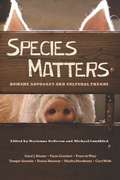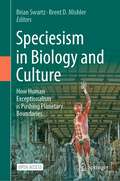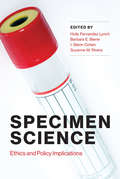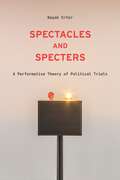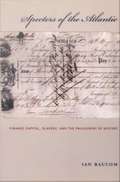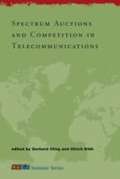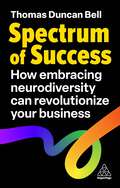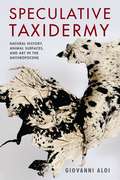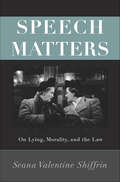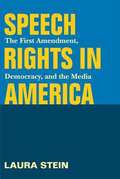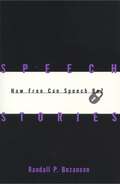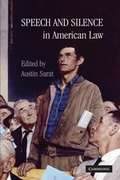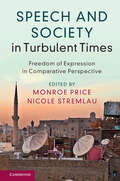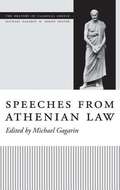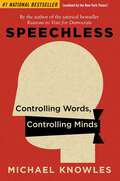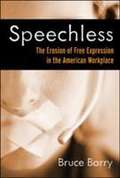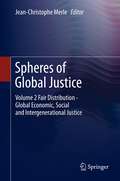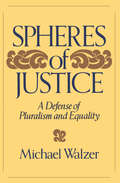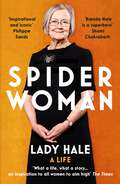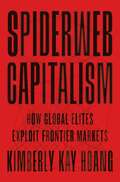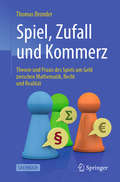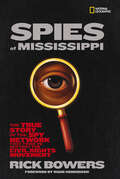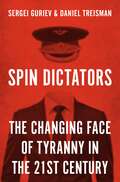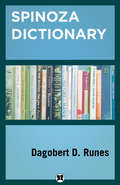- Table View
- List View
Species Matters: Humane Advocacy and Cultural Theory
by Michael Lundblad Marianne DeKovenWhy has the academy struggled to link advocacy for animals to advocacy for various human groups? Within cultural studies, in which advocacy can take the form of a theoretical intervention, scholars have resisted arguments that add "species" to race, class, gender, sexuality, disability, and other human-identity categories as a site for critical analysis. Species Matters considers whether cultural studies should pay more attention to animal advocacy and whether, in turn, animal studies should pay more attention to questions raised by cultural theory. The contributors to this volume explore these issues particularly in relation to the "humane" treatment of animals and various human groups and the implications, both theoretical and practical, of blurring the distinction between "the human" and "the animal." They address important questions raised by the history of representing humans as the only animal capable of acting humanely and provide a framework for reconsidering the nature of humane discourse, whether in theory, literary and cultural texts, or current advocacy movements outside of the academy.
Speciesism in Biology and Culture: How Human Exceptionalism is Pushing Planetary Boundaries
by Brent D. Mishler Brian SwartzThis open access book explores a wide-ranging discussion about the sociopolitical, cultural, and scientific ramifications of speciesism and world views that derive from it. In this light, it integrates subjects across the natural sciences, social sciences, and humanities. The 21st-century western world is anthropocentric to an extreme; we adopt unreasonably self-centered and self-serving ideas and lifestyles. Americans consume more energy resources per person than most other nations on Earth and have little concept of how human ecology and population biology interface with global sustainability. We draw upon religion, popular culture, politics, and technology to justify our views and actions, yet remain self-centered because our considerations rarely extend beyond our immediate interests. Stepping upward on the hierarchy from “racism,” “speciesism” likewise refers to the view that unique natural kinds (species) exist and are an important structural element of biodiversity. This ideology manifests in the cultural idea that humans are distinct from and intrinsically superior to other forms of life. It further carries a plurality of implications for how we perceive ourselves in relation to nature, how we view Judeo-Christian religions and their tenets, how we respond to scientific data about social problems such as climate change, and how willing we are to change our actions in the face of evidence.
Specimen Science: Ethics and Policy Implications (Basic Bioethics)
by Holly Lynch Barbara Bierer I. Cohen Suzanne RiveraLegal, regulatory, and ethical perspectives on balancing social benefit and human autonomy in research using human biospecimens.Advances in medicine often depend on the effective collection, storage, research use, and sharing of human biological specimens and associated data. But what about the sources of such specimens? When a blood specimen is drawn from a vein in your arm, is that specimen still you? Is it your property, intellectual or otherwise? Should you be allowed not only to consent to its use in research but also to specify under what circumstances it may be used? These and other questions are at the center of a vigorous debate over the use of human biospecimens in research. In this book, experts offer legal, regulatory, and ethical perspectives on balancing social benefit and human autonomy in biospecimen research.After discussing the background to current debates as well as several influential cases, including that of Henrietta Lacks, the contributors consider the rights, obligations, risks, and privacy of the specimen source; different types of informed consent under consideration (broad, blanket, and specific); implications for special patient and researcher communities; and the governance of biospecimen repositories and the responsibilities of investigators.ContributorsRebecca A. Anderson, Heide Aungs, Avery Avrakotos, Mark Barnes, Jill Barnholtz-Sloan, Benjamin Berkman, Barbara E. Bierer, Mark A. Borreliz, Jeffrey R. Botkin, Dan Brock, Ellen Wright Clayton, I. Glenn Cohen, Lisa Eckstein, Barbara J. Evans, Emily Chi Fogler, Nanibaa' A. Garrison, Pamela Gavin, Aaron J. Goldenberg, Christine Grady, Kate Gallin Heffernan, Marylana Saadeh Helou, Sara Chandros Hull, Elisa A. Hurley, Steven Joffe, Erin P. Johnson, Julie Kaneshiro, Aaron S. Kesselheim, Isaac Kohane, David Korn, Russell Korobkin, Bernard Lo, Geoffrey Lomax, Kimberly Hensle Lowrance, Holly Fernandez Lynch, Bradley A. Malin, Karen J. Maschke, Eric M. Meslin, P. Pearl O'Rourke, Quinn T. Ostrom, David Peloquin, Rebecca Pentz, Jane Perlmutter, Ivor Pritchard, Suzanne M. Rivera, Erin Rothwell, Andrew P. Rusczek, Rachel E. Sachs, Carol Weil, David Wendler, Benjamin Wilfond, Susan M. Wolf
Spectacles and Specters: A Performative Theory of Political Trials
by Başak ErtürWINNER, SLSA SOCIO-LEGAL THEORY AND HISTORY PRIZESHORTLISTED, THE HART-SLSA BOOK PRIZESpectacles and Specters draws on theories of performativity to conceptualize the entanglements of law and political violence, offering a radical departure from accounts that consider political trials as instrumental in exercising or containing political violence. Legal scholar Başak Ertür argues instead that making sense of the often incalculable interpenetrations of law, politics, and violence in trials requires shifting the focus away from law’s instrumentality to its performativity.Ertür develops a theory of political trials by reconstructing and building on a legacy of critical thought on Nuremberg in close engagement with theories of performativity. She then offers original case studies that introduce a new perspective by looking beyond the Holocaust trials, to the Armenian genocide and its fragmentary legal aftermaths. These cases include the 1921 trial of Soghomon Tehlirian, the 2007-21 Hrant Dink Murder Trial, and the 2015 case before the European Court of Human Rights concerning the denial of the Armenian genocide. Enabling us to capture the various modalities in which the political emerges in, through and in relation to legal forms on the stage of the trial, this focus on law’s performativity also allows us to account for how sovereign schemes can misfire and how trials can come to have unintended political lives and afterlives. Further, it reveals how law is entangled with and perpetuates certain histories of violence, rather than simply ever mastering these histories or providing closure.
Specters of the Atlantic: Finance Capital, Slavery, and the Philosophy of History
by Ian BaucomIn September 1781, the captain of the British slave ship Zong ordered 133 slaves thrown overboard, enabling the ship's owners to file an insurance claim for their lost "cargo. " Accounts of this horrific event quickly became a staple of abolitionist discourse on both sides of the Atlantic. Ian Baucom revisits, in unprecedented detail, the Zong atrocity, the ensuing court cases, reactions to the event and trials, and the business and social dealings of the Liverpool merchants who owned the ship. Drawing on the work of an astonishing array of literary and social theorists, including Walter Benjamin, Giovanni Arrighi, Jacques Derrida, and many others, he argues that the tragedy is central not only to the trans-Atlantic slave trade and the political and cultural archives of the black Atlantic but also to the history of modern capital and ethics. To apprehend the Zong tragedy, Baucom suggests, is not to come to terms with an isolated atrocity but to encounter a logic of violence key to the unfolding history of Atlantic modernity. Baucom contends that the massacre and the trials that followed it bring to light an Atlantic cycle of capital accumulation based on speculative finance, an economic cycle that has not yet run its course. The extraordinarily abstract nature of today's finance capital is the late-eighteenth-century system intensified. Yet, as Baucom highlights, since the late 1700s, this rapacious speculative culture has had detractors. He traces the emergence and development of a counter-discourse he calls melancholy realism through abolitionist and human-rights texts, British romantic poetry, Scottish moral philosophy, and the work of late-twentieth-century literary theorists. In revealing how the Zong tragedy resonates within contemporary financial systems and human-rights discourses, Baucom puts forth a deeply compelling, utterly original theory of history: one that insists that an eighteenth-century atrocity is not past but present within the future we now inhabit.
Spectrum Auctions and Competition in Telecommunications
by Gerhard Illing Ulrich KlühThis book collects essays on this topic by leading analysts of telecommunications and the European auction experience, all but one presented at a November 2001 CESifo conference; comments and responses are included as well, to preserve some of the controversy .
Spectrum of Success: How Embracing Neurodiversity Can Revolutionize Your Business
by Thomas Duncan BellUnlock the full potential of neurodiverse people and create a more inclusive, supportive and adaptive business with Spectrum of Success.20% of the global population is neurodivergent, but the world isn't built for them. Their incredible talent becomes wasted when they don't have the opportunity to succeed. Spectrum of Success uncovers how we can create a more accessible work culture that champions neurodiversity and promotes allyship and collaboration.Through fascinating research and inspiring interviews with neurodiverse business leaders, mental health expert Thomas Duncan Bell uncovers how we can support and champion neurodiversity at work and beyond. Drawing upon his own experiences with ADHD and bipolar disorder, the book also offers an enlightening insight into how neurodiverse individuals can thrive in the modern world.
Speculative Taxidermy: Natural History, Animal Surfaces, and Art in the Anthropocene (Critical Life Studies)
by Giovanni AloiTaxidermy, once the province of natural history and dedicated to the pursuit of lifelike realism, has recently resurfaced in the world of contemporary art, culture, and interior design. In Speculative Taxidermy, Giovanni Aloi offers a comprehensive mapping of the discourses and practices that have enabled the emergence of taxidermy in contemporary art. Drawing on the speculative turn in philosophy and recovering past alternative histories of art and materiality from a biopolitical perspective, Aloi theorizes speculative taxidermy: a powerful interface that unlocks new ethical and political opportunities in human-animal relationships and speaks to how animal representation conveys the urgency of addressing climate change, capitalist exploitation, and mass extinction.A resolutely nonanthropocentric take on the materiality of one of the most controversial mediums in art, this approach relentlessly questions past and present ideas of human separation from the animal kingdom. It situates taxidermy as a powerful interface between humans and animals, rooted in a shared ontological and physical vulnerability. Carefully considering a select number of key examples including the work of Nandipha Mntambo, Maria Papadimitriou, Mark Dion, Berlinde De Bruyckere, Roni Horn, Oleg Kulik, Steve Bishop, Snæbjörnsdóttir/Wilson, and Cole Swanson, Speculative Taxidermy contextualizes the resilient presence of animal skin in the gallery space as a productive opportunity to rethink ethical and political stances in human-animal relationships.
Speech Matters: On Lying, Morality, and the Law (Carl G. Hempel Lecture Series #4)
by Seana Valentine ShiffrinTo understand one another as individuals and to fulfill the moral duties that require such understanding, we must communicate with each other. We must also maintain protected channels that render reliable communication possible, a demand that, Seana Shiffrin argues, yields a prohibition against lying and requires protection for free speech. This book makes a distinctive philosophical argument for the wrong of the lie and provides an original account of its difference from the wrong of deception.Drawing on legal as well as philosophical arguments, the book defends a series of notable claims—that you may not lie about everything to the "murderer at the door," that you have reasons to keep promises offered under duress, that lies are not protected by free speech, that police subvert their mission when they lie to suspects, and that scholars undermine their goals when they lie to research subjects.Many philosophers start to craft moral exceptions to demands for sincerity and fidelity when they confront wrongdoers, the pressures of non-ideal circumstances, or the achievement of morally substantial ends. But Shiffrin consistently resists this sort of exceptionalism, arguing that maintaining a strong basis for trust and reliable communication through practices of sincerity, fidelity, and respecting free speech is an essential aspect of ensuring the conditions for moral progress, including our rehabilitation of and moral reconciliation with wrongdoers.
Speech Rights in America: The First Amendment, Democracy, and the Media
by Laura SteinThe First Amendment is the principle guarantor of speech rights in the United States, but the Supreme Court's interpretations of it often privilege the interests of media owners over those of the broader citizenry. In Speech Rights in America, Laura Stein argues that such rulings alienate citizens from their rights, corrupt the essential workings of democracy, and prevent the First Amendment from performing its critical role as a protector of free speech. Drawing on the best of the liberal democratic tradition, Stein demonstrates that there is a significant gap between First Amendment law and the speech rights necessary to democratic communication, and proposes an alternative set of principles to guide future judicial, legislative, and cultural policy on old and new media.
Speech Stories: How Free Can Speech Be?
by Randall P. BezansonWhen we talk about what "freedom of speech" means in America, the discussion almost always centers on freedom rather than speech. Taking for granted that speech is an unambiguous and stable category, we move to considering how much freedom speech should enjoy. But, as Randall Bezanson demonstrates in Speech Stories, speech is a much more complicated and dynamic notion than we often assume. In an age of rapidly accelerated changes in discourse combined with new technologies of communication, the boundaries and substance of what we traditionally deem speech are being reconfigured in novel and confusing ways. In order to spark thought, discussion, and debate about these complexities and ambiguities, Bezanson probes the "stories" behind seven controversial free speech cases decided by the Supreme Court. These stories touch upon the most controversial and significant of contemporary first amendment issues: government restrictions on hate speech and obscene and indecent speech; pornography and the subordination of women; the constitutionality of campaign finance reform; and the treatment to be accorded new technologies of communication under the Constitution. The result is a provocative engagement of the reader in thinking about the puzzles and paradoxes of our commitment to free expression.
Speech and Silence in American Law
by Austin SaratRather than abstract philosophical discussion or yet another analysis of legal doctrine, Speech and Silence in American Law seeks to situate speech and silence, locating them in particular circumstances and contexts and asking how context matters in facilitating speech or demanding silence. To understand speech and silence we have to inquire into their social life and examine the occasions and practices that call them forth and that give them meaning. Among the questions addressed in this book are, Who is authorized to speak? And what are the conditions that should be attached to the speaking subject? Are there occasions that call for speech and others that demand silence? What is the relationship between the speech act and the speaker? Taking these questions into account helps readers understand what compels speakers and what problems accompany speech without a known speaker, allowing us to assess how silence speaks and how speech renders the silent more knowable.
Speech and Society in Turbulent Times: Freedom of Expression in Comparative Perspective
by Monroe Price Nicole StremlauThis volume explores how societies are addressing challenging questions about the relationship between expression, traditional and societal values, and the transformations introduced by new information communications technologies. It seeks to identify alternative approaches to the role of speech and expression in the organization of societies as well as efforts to shape the broader global information society. How have different societies or communities drawn on the ideas of philosophers, religious leaders or politicians, both historical and contemporary, that addressed questions of speech, government, order or freedoms and applied them, with particular attention to applications in the digital age? The essays include a wide variety of cultural and geographic contexts to identify different modes of thinking. The goal is to both unpack the 'normative' internet and free expression debate and to deepen understanding about why certain internet policies and models are being pursued in very different local or national contexts as well as on a global level.
Speeches From Athenian Law
by Michael GagarinThis is the sixteenth volume in the Oratory of Classical Greece. This series presents all of the surviving speeches from the late fifth and fourth centuries BC in new translations prepared by classical scholars who are at the forefront of the discipline. These translations are especially designed for the needs and interests of today's undergraduates, Greekless scholars in other disciplines, and the general public. Classical oratory is an invaluable resource for the study of ancient Greek life and culture. The speeches offer evidence on Greek moral views, social and economic conditions, political and social ideology, law and legal procedure, and other aspects of Athenian culture that have recently been attracting particular interest: women and family life, slavery, and religion, to name just a few. This volume assembles twenty-one speeches previously published in the Oratory series. The speeches are taken from a wide range of different kinds of cases-homicide, assault, commercial law, civic status, sexual offenses, and others-and include many of the best-known speeches in these areas. They are Antiphon, Speeches 1, 2, 5, and 6; Lysias 1, 3, 10-11, 23, 24, and 32; Isocrates 17; Isaeus 11; Hyperides 3; Demosthenes 21, 35, 54, 55, 57, and 59; and Aeschines 1. The volume is intended primarily for use in teaching courses in Greek law or related areas such as Greek history. It also provides the introductions and notes that originally accompanied the individual speeches, revised slightly to shift the focus onto law.
Speechless: Controlling Words, Controlling Minds
by Michael Knowles&“Every single American needs to read Michael Knowles&’s Speechless. I don&’t mean &‘read it eventually.&’ I mean: stop what you&’re doing and pick up this book.&”—CANDACE OWENS"The most important book on free speech in decades—read it!&” —SENATOR TED CRUZA New Strategy: We Win, They LoseThe Culture War is over, and the culture lost.The Left&’s assault on liberty, virtue, decency, the Republic of the Founders, and Western civilization has succeeded.You can no longer keep your social media account—or your job—and acknowledge truths such as: Washington, Jefferson, and Columbus were great men. Schools and libraries should not coach children in sexual deviance. Men don&’t have uteruses.How did we get to this point?Michael Knowles of The Daily Wire exposes and diagnosis the losing strategy we have fallen for and shows how we can change course—and start winning.In the groundbreaking Speechless: Controlling Words, Controlling Minds Knowles reveals:How the &“free speech absolutists&” gave away the storeThe First Amendment does not require a value-neutral public squareHow the Communists figured out that their revolution could never succeed as long as the common man was attached to his own cultureWhere political correctness came fromHow, comply or resist, political correctness is a win-win game for the bad guysWhy taking our stand on &“freedom of speech&” helps put atheism, decadence, and nonsense on the same plane with faith, virtue, and realityThe real question: Will we shut down drag queen story hour, or cancel Abraham Lincoln?For 170 years the First Amendment was compatible with prayer in public schoolHow the atheists got the Warren Court to rule their wayTo this day, there&’s a First Amendment exception for obscenity. What exactly is the argument that perverts&’ teaching toddlers to twerk is not obscene?Read Speechless: Controlling Words, Controlling Minds if you want to learn how to take the fight to the enemy.
Speechless: The Erosion of Free Expression in the American Workplace
by Bruce BarryA factory worker is fired because her boss dislikes the political bumper sticker on her car in the parking lot. Another is canned after refusing to display an American flag at his workstation.
Spheres of Global Justice: Volume 1 Global Challenges to Liberal Democracy. Political Participation, Minorities and Migrations; Volume 2 Fair Distribution - Global Economic, Social and Intergenerational Justice
by Jean-Christophe MerleSpheres of Global Justice analyzes six of the most important and controversial spheres of global justice, each concerning a specific global social good. These spheres are democratic participation, migrations, cultural minorities, economic justice, social justice, and intergenerational justice. Together they constitute two constellations dealt with, in this collection of essays by leading scholars, in two different volumes: Global Challenges to Liberal Democracy and Fair Distribution. These essays illustrate each of the spheres, delving into their differences, commonalities, collisions and interconnections. Unlike many writings on global justice, Spheres of Global Justice does not content itself with describing the painful and advantageous effects of the globalization process as being ipso facto a global injustice or a just global order. Rather, this multidisciplinary collection of essays, from a pluralist inspiration, combines empirical analysis with theoretical approaches and ethical principles, paying close attention to two aspects of the effects of the globalization process. These aspects are the causal relationships that lead to such effects and the kinds of obligations, or of normative relationships between global rights and correlative duties, that applies to each specific individual case. This volume illustrates how diverse global obligations are, and how they can be, grounded in diverse relationships (identity, ability to provide help, causal responsibility, past injustices, protection of agency and promotion of independence, etc.). These essays also demonstrate that an ethical global approach has not only international or transnational, but also domestic, local and interpersonal dimensions.
Spheres of Justice: A Defense of Pluralism and Equality
by Michael WalzerThe distinguished political philosopher and author of the widely acclaimed Just and Unjust Wars analyzes how society distributes not just wealth and power but other social "goods" like honor, education, work, free time--even love.
Spider Woman: A Life – by the former President of the Supreme Court
by Lady HaleLady Hale is an inspirational figure admired for her historic achievements and for the causes she has championed. Spider Woman is her story. As 'a little girl from a little school in a little village in North Yorkshire', she only went into the law because her headteacher told her she wasn't clever enough to study history. She became the most senior judge in the country but it was an unconventional path to the top. How does a self-professed 'girly swot' get ahead in a profession dominated by men? Was it a surprise that the perspectives of women and other disadvantaged groups had been overlooked, or that children's interests were marginalised? A lifelong smasher of glass-ceilings, who took as her motto 'women are equal to everything', her landmark rulings in areas including domestic violence, divorce, mental health and equality were her attempt to correct that. As President of the Supreme Court, Lady Hale won global attention in finding the 2019 prorogation of Parliament to be unlawful. Yet that dramatic moment was merely the pinnacle of a career throughout which she was hailed as a pioneering reformer. Wise, warm and inspiring, Spider Woman shows how the law shapes our world and supports us in crisis. It is the story of how Lady Hale found that she could overcome the odds, which shows that anyone from similar beginnings will find that they can cope too.
Spiderweb Capitalism: How Global Elites Exploit Frontier Markets
by Kimberly Kay HoangA behind-the-scenes look at how the rich and powerful use offshore shell corporations to conceal their wealth and make themselves richerIn 2015, the anonymous leak of the Panama Papers brought to light millions of financial and legal documents exposing how the superrich hide their money using complex webs of offshore vehicles. Spiderweb Capitalism takes you inside this shadow economy, uncovering the mechanics behind the invisible, mundane networks of lawyers, accountants, company secretaries, and fixers who facilitate the illicit movement of wealth across borders and around the globe.Kimberly Kay Hoang traveled more than 350,000 miles and conducted hundreds of in-depth interviews with private wealth managers, fund managers, entrepreneurs, C-suite executives, bankers, auditors, and other financial professionals. She traces the flow of capital from offshore funds in places like the Cayman Islands, Samoa, and Panama to special-purpose vehicles and holding companies in Singapore and Hong Kong, and how it finds its way into risky markets onshore in Vietnam and Myanmar. Hoang reveals the strategies behind spiderweb capitalism and examines the moral dilemmas of making money in legal, financial, and political gray zones.Dazzlingly written, Spiderweb Capitalism sheds critical light on how global elites capitalize on risky frontier markets, and deepens our understanding of the paradoxical ways in which global economic growth is sustained through states where the line separating the legal from the corrupt is not always clear.
Spiel, Zufall und Kommerz: Theorie und Praxis des Spiels um Geld zwischen Mathematik, Recht und Realität
by Thomas BronderDas Spiel mit dem Glück Von Brett- und Kartenspielen über Glücksspielautomaten bis hin zu Lotterien und Wettbüros – dieses Buch ist ebenso breit angelegt wie die Welt des Spiels und zeigt, was all diesen Spielen gemeinsam ist und wie sie wirklich funktionieren. Dabei geht um den Vergleich diverser Spielsysteme anhand wertneutraler Merkmale insbesondere zum Unterschied von Glücks- und Geschicklichkeitsspielen. Wo regieren der Zufall und der Kommerz, wo die Geschicklichkeit? Wie greifen sie ineinander, und welchen rechtlichen Regelungen unterliegt das kommerzielle Spiel? Was macht den besonderen Reiz der Pokerspiele aus? Viele Beispiele zeichnen historische Entwicklungen nach, Zusammenhänge und Gesetze der Wahrscheinlichkeitstheorie werden anschaulich erklärt und lange Spielfolgen bis zum „Point of no return“ bildlich dargestellt. Thomas Bronder räumt außerdem mit vielen Irrtümern, ungenauen Begriffsvorstellungen und Missverständnissen auf, etwa zu Chancengleichheit, Verlusttempo und Auszahlquoten. Vom erfolgreichen Buchmachen über erfolglose Gewinnsysteme bis zu Schneeballsystemen, Falschspiel, Betrug und Manipulation wird kein Thema ausgelassen. So liegt hiermit nun eine kleine „Bibel“ des Spiels um Geld vor, die nicht nur für Spieler, Journalisten und Juristen interessant ist.Die zweite Auflage enthält viele Ergänzungen und Korrekturen mit einem umfangreichen Sachwortverzeichnis zum Nachschlagen. Sie teilt Nullsummenspiele in fünf Klassen ein, beschreibt Besonderheiten beim Pokern und geht auf die Probleme mit Online-Glücksspielen im Internet ein.
Spies of Mississippi: The True Story of the Spy Network that Tried to Destroy the Civil Rights Movement
by Rick BowersThe Spies of Mississippi is a compelling story of how state spies tried to block voting rights for African Americans during the Civil Rights era. This book sheds new light on one of the most momentous periods in American history.Author Rick Bowers has combed through primary-source materials and interviewed surviving activists named in once-secret files, as well as the writings and oral histories of Mississippi civil rights leaders. Readers get first-hand accounts of how neighbors spied on neighbors, teachers spied on students, ministers spied on church-goers, and spies even spied on spies.The Spies of Mississippi will inspire readers with the stories of the brave citizens who overcame the forces of white supremacy to usher in a new era of hope and freedom—an age that has recently culminated in the election of Barack Obama
Spin Dictators: The Changing Face of Tyranny in the 21st Century
by Daniel Treisman Sergei GurievHow a new breed of dictators holds power by manipulating information and faking democracyHitler, Stalin, and Mao ruled through violence, fear, and ideology. But in recent decades a new breed of media-savvy strongmen has been redesigning authoritarian rule for a more sophisticated, globally connected world. In place of overt, mass repression, rulers such as Vladimir Putin, Recep Tayyip Erdogan, and Viktor Orbán control their citizens by distorting information and simulating democratic procedures. Like spin doctors in democracies, they spin the news to engineer support. Uncovering this new brand of authoritarianism, Sergei Guriev and Daniel Treisman explain the rise of such “spin dictators,” describing how they emerge and operate, the new threats they pose, and how democracies should respond.Spin Dictators traces how leaders such as Singapore’s Lee Kuan Yew and Peru’s Alberto Fujimori pioneered less violent, more covert, and more effective methods of monopolizing power. They cultivated an image of competence, concealed censorship, and used democratic institutions to undermine democracy, all while increasing international engagement for financial and reputational benefits. The book reveals why most of today’s authoritarians are spin dictators—and how they differ from the remaining “fear dictators” such as Kim Jong-un and Bashar al-Assad, as well as from masters of high-tech repression like Xi Jinping.Offering incisive portraits of today’s authoritarian leaders, Spin Dictators explains some of the great political puzzles of our time—from how dictators can survive in an age of growing modernity to the disturbing convergence and mutual sympathy between dictators and populists like Donald Trump.
Spin Dictators: The Changing Face of Tyranny in the 21st Century
by Daniel Treisman Sergei GurievHow a new breed of dictators holds power by manipulating information and faking democracyHitler, Stalin, and Mao ruled through violence, fear, and ideology. But in recent decades a new breed of media-savvy strongmen has been redesigning authoritarian rule for a more sophisticated, globally connected world. In place of overt, mass repression, rulers such as Vladimir Putin, Recep Tayyip Erdogan, and Viktor Orbán control their citizens by distorting information and simulating democratic procedures. Like spin doctors in democracies, they spin the news to engineer support. Uncovering this new brand of authoritarianism, Sergei Guriev and Daniel Treisman explain the rise of such “spin dictators,” describing how they emerge and operate, the new threats they pose, and how democracies should respond.Spin Dictators traces how leaders such as Singapore’s Lee Kuan Yew and Peru’s Alberto Fujimori pioneered less violent, more covert, and more effective methods of monopolizing power. They cultivated an image of competence, concealed censorship, and used democratic institutions to undermine democracy, all while increasing international engagement for financial and reputational benefits. The book reveals why most of today’s authoritarians are spin dictators—and how they differ from the remaining “fear dictators” such as Kim Jong-un and Bashar al-Assad, as well as from masters of high-tech repression like Xi Jinping.Offering incisive portraits of today’s authoritarian leaders, Spin Dictators explains some of the great political puzzles of our time—from how dictators can survive in an age of growing modernity to the disturbing convergence and mutual sympathy between dictators and populists like Donald Trump.
Spinoza Dictionary
by Dagobert D. RunesIn this work, Baruch Spinoza, one of the cardinal thinkers of all times, answers the eternal questions of man and his passions, and God and nature. In the deepest sense, this dictionary of Spinoza's philosophy is a veritable treasury of sublime wisdom. In his introduction, Dagobert D. Runes, a life-long student of the philosopher, sheds new light on Spinoza's private, political and religious life, and exposes and explains the dramatic story of his apostasy. If the reader despairs of the business of finding his way through Spinoza's works, here he will find a reliable guide speaking in Spinoza's own words. "The grand ideas of Spinoza's Ethics are brought out clearly in this book: not less than the heroic illusions of this great and passionate man." --Albert Einstein
